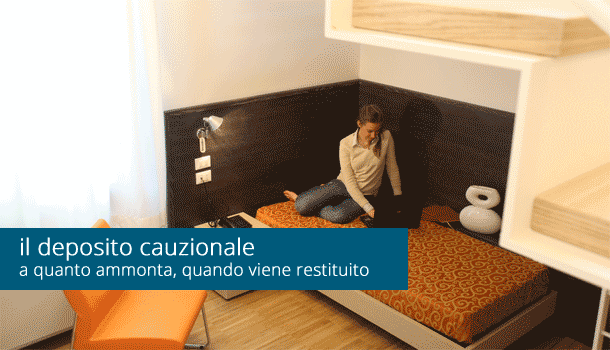Indice contenuto
The security deposit in the lease agreement
Time for new leases: among the various sections of the contract, one of the most talked about is the security deposit, better known as the security deposit.
The term security deposit is used to define the cash deposit which is required by the landlord at the time the lease and has the purpose of protecting him from possible defaults places in be by the tenant, such as non-payment of several months’ rent or possible damage caused to the rented room or apartment. It is, of course, necessary that the amount paid be specified within the lease agreement entered into between the two parties (read here Why it is important to enter into a lease agreement.).
How much is the security deposit
Law 392 of 1978 regulating the leasing of urban real estate states in Article 11 that. the security deposit may amount to a maximum of three months’ rent (excluding expenses): so, for example, for a monthly rent of €300, the security deposit will amount to a maximum of €900, payable
one-off
From the tenant to the landlord at the time the contract is signed. Generally landlords require a security deposit equal to one or two months’ rent, but nothing would prohibit them from requiring either only one (lucky for the tenant!) or three.
How to pay the security deposit
he security deposit can be paid with:
- cash payment
- a surety guarantee – bank or insurance
- Bearer bank/postal savings book if less than €1,000 in amount
The return of the deposit
A common mistake on the part of tenants is to consider the security deposit as an advance on monthly rent payments, then claiming not to pay the last ones, especially near the end of the contract. But, as we said, it is precisely a security deposit that serves to protect the landlord throughout the duration of the lease; moreover, the verification regarding the lack of any damage (
condicio sine qua non
for the return of the deposit) may be fully effected, unless otherwise agreed with the landlord, only after the termination of the contract and the vacating of the premises. In addition, provision is usually made in the contracts themselves for the so-called prohibition on the deduction of the security deposit from monthly rent payments.
At the beginning of the lease relationship, upon handover of the property, a “handover report” must be drawn up describing the condition of the property being leased (it is an integral part of the contract and is signed by both landlord and tenant); at the end of the lease, it is customary to conduct an inspection and draw up a “report of redelivery” within which must be highlighted, and if possible substantiated,
any
damage done to the premises and quantify the security deposit to be retained for that reason. The return of the security deposit can be made within a maximum of 10 years (following the 10 years, the statute of limitations will occur and the former tenant will not be able to claim reimbursement).
Not everyone knows that the same Article 11 of Law 392/78 stipulates that the security deposit produces the legal interest, which must be paid to the tenant at the end of each lease year, but several Supreme Court rulings have ruled that if interest has not been paid annually, it must be paid on the date of final expiration of the lease; unlike the security deposit, the statute of limitations provided for legal interest, and thus the period of time within which the (now former) tenant can assert his right to receive it, is five years, to be calculated from the date of termination of the contractual relationship: this makes it impossible for the right to have legal interest paid to be time-barred during the course of the lease itself.
What about the deposit?
Nothing to do with it 🙂 Although this is often confused with the security deposit, the deposit is a sum of money that can be temporarily paid to the real estate agency or landlord by the prospective tenant if the tenant intends to conclude and enter into the lease, thus as a real and concrete expression of interest in the room or property that will be leased. Once the contract is signed, the deposit must be returned to the tenant, or it can be turned into part of the security deposit or the first month’s rent.
Other expenses
Although signing the contract is certainly a nice end point , the possibility of facing new expenses is not entirely averted: read the article on the incidental expenses: what the landlord pays, what the tenant pays.
Ti potrebbe interessare anche:

Pubblicato il 19-05-2023 11:05:53

Pubblicato il 13-05-2023 15:34:33
Pubblicato il 09-05-2023 14:39:52

Pubblicato il 09-01-2023 11:45:02

Pubblicato il
